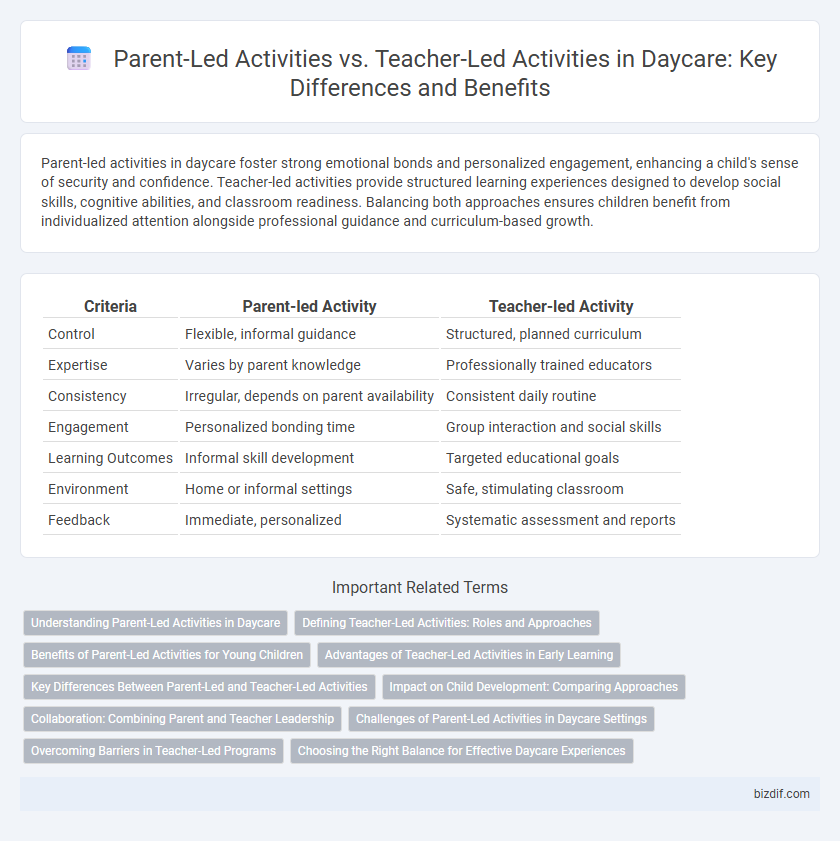Parent-led activities in daycare foster strong emotional bonds and personalized engagement, enhancing a child's sense of security and confidence. Teacher-led activities provide structured learning experiences designed to develop social skills, cognitive abilities, and classroom readiness. Balancing both approaches ensures children benefit from individualized attention alongside professional guidance and curriculum-based growth.
Table of Comparison
| Criteria | Parent-led Activity | Teacher-led Activity |
|---|---|---|
| Control | Flexible, informal guidance | Structured, planned curriculum |
| Expertise | Varies by parent knowledge | Professionally trained educators |
| Consistency | Irregular, depends on parent availability | Consistent daily routine |
| Engagement | Personalized bonding time | Group interaction and social skills |
| Learning Outcomes | Informal skill development | Targeted educational goals |
| Environment | Home or informal settings | Safe, stimulating classroom |
| Feedback | Immediate, personalized | Systematic assessment and reports |
Understanding Parent-Led Activities in Daycare
Parent-led activities in daycare foster deeper parent-child bonding by allowing caregivers to directly engage in their child's learning and playtime. These activities encourage personalized interaction, enhancing emotional security and supporting developmental milestones through familiar routines. Research indicates that parent involvement in daycare settings significantly improves children's social skills and academic readiness compared to exclusively teacher-led programs.
Defining Teacher-Led Activities: Roles and Approaches
Teacher-led activities in daycare settings involve structured lessons and guided interactions designed to promote cognitive, social, and emotional development under the supervision of trained educators. Teachers utilize age-appropriate strategies, including direct instruction, modeling, and scaffolded learning, to facilitate skill acquisition and classroom management. These approaches prioritize developmental milestones, ensuring activities align with early childhood education standards and individualized learning goals.
Benefits of Parent-Led Activities for Young Children
Parent-led activities in daycare settings foster stronger emotional bonds and enhance communication skills as children engage with trusted caregivers. These activities promote personalized learning experiences tailored to the child's interests, boosting confidence and creativity. Active parental involvement supports social development and reinforces positive behavioral patterns in young children.
Advantages of Teacher-Led Activities in Early Learning
Teacher-led activities in early learning provide structured guidance that supports skill development in areas such as literacy, numeracy, and social interaction. These activities allow educators to tailor lessons based on developmental milestones and individual learning needs, enhancing cognitive and emotional growth. Consistent teacher-led instruction also ensures a stable routine, fostering a secure learning environment that promotes confidence and collaboration among children.
Key Differences Between Parent-Led and Teacher-Led Activities
Parent-led activities in daycare often emphasize personalized interaction and bonding, allowing parents to tailor the experience to their child's unique needs and interests. Teacher-led activities typically follow structured curricula designed to promote developmental milestones through expert-guided learning and socialization. The key differences lie in the level of professional guidance, consistency of educational goals, and the balance between individualized attention and group dynamics.
Impact on Child Development: Comparing Approaches
Parent-led activities in daycare settings often foster stronger emotional bonds and enhance social skills through personalized interaction, while teacher-led activities provide structured learning environments that promote cognitive development and routine adherence. Research indicates that a balanced integration of both approaches maximizes developmental outcomes, supporting language acquisition, problem-solving abilities, and emotional regulation in young children. Effective daycare programs strategically combine parent involvement with skilled educator guidance to nurture holistic child development.
Collaboration: Combining Parent and Teacher Leadership
Collaborative efforts between parents and teachers in daycare settings enhance children's development by merging diverse perspectives and expertise. Parent-led activities bring family values and home experiences into the learning environment, while teacher-led activities provide structured educational frameworks and developmental goals. This joint leadership fosters consistent communication, tailored support, and a more holistic approach to early childhood education.
Challenges of Parent-Led Activities in Daycare Settings
Parent-led activities in daycare settings often face challenges such as inconsistent scheduling, varying levels of parental engagement, and limited expertise in early childhood education techniques. These factors can lead to less structured learning experiences compared to teacher-led activities, which are typically designed with developmental milestones and educational standards in mind. The variability in parental availability and skill may impact the quality and effectiveness of activities, affecting children's social and cognitive development.
Overcoming Barriers in Teacher-Led Programs
Overcoming barriers in teacher-led daycare programs involves addressing communication gaps, fostering trust, and incorporating parental input to enhance child development outcomes. Structured teacher-led activities benefit from clear guidelines and consistent routines, which can be optimized by integrating parent feedback to tailor learning experiences. Strengthening collaboration between teachers and parents through regular updates and interactive sessions reduces misunderstandings and supports a cohesive educational environment.
Choosing the Right Balance for Effective Daycare Experiences
Parent-led activities in daycare promote strong emotional bonds and encourage personalized learning, enriching the child's development through familiar interactions. Teacher-led activities provide structured guidance and socialization opportunities, ensuring educational goals and age-appropriate skills are addressed. Balancing parent-led and teacher-led activities optimizes child engagement, supports diverse developmental needs, and creates a holistic daycare experience conducive to growth and confidence.
Parent-led activity vs Teacher-led activity Infographic

 bizdif.com
bizdif.com